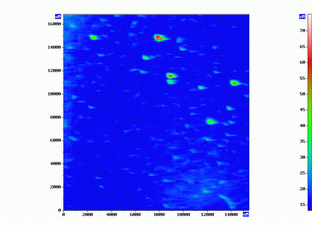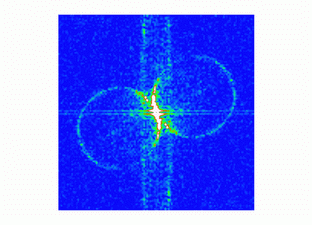


Abstract.
A scanning plasmon near-field microscope with gold and silver
tips, operating in tapping mode of atomic force
microscope (AFM)
is used to measure the distribution of the near-field
intensity of surface plasmons on rough silver surfaces.
Using the fast Fourier transformation (FFT) of near-field
images it is shown that the distribution of the near-field
intensity on the surface is the result of the interference
between scattering plasmons and the initial plasmon beam.
Multiple scattering effects such as
backscattering enhancement
of
surface plasmons are also observed.
It is shown that a
nonuniformity in the registration of the scattered light
leads to some artifacts in near-field images. Several
registration modes of the light signal are considered and it
is shown that recording the light signal at the second
harmonic of the tapping frequency one can pick out the signal
associated with an electromagnetic (em) resonance in a
tip-surface (sphere-plane) structure.
Possible implementations of this em resonance for studies of
local permittivities and local nonlinear susceptibilities of
intermediate media between the tip and surface with a subtip
resolution are discussed.



Fig.4 AFM (a) and SPNM (b) images of the silver surface (scan size is 15800~nm$\times$16800~nm). (d) is FFT of SPNM image.

Fig.7 The
backscattering enhancement effect: topography (a), the
near-field image (b) of the surface and FFT of the
near-field image (d) (the arrow length on FFT image
corresponds the surface plasmon wavevector length $|{\mathbf
k}_{\mathrm pl}|$).
Scan size is 18000~nm$\times$18000~nm.
- Говорят, что он был Повелителем Драконов. И ты, вроде бы, тоже.
Ну-ка расскажи мне, что это такое?
Она все время старалась говорить насмешливо, однако он отвечал ей
прямо и просто, принимая все вопросы как должное.
- Это тот с кем драконы станут разговаривать. - сказал он. - Только такой
человек может называться Повелителем Драконов; во всяком случае, суть в этом.
Ни трюком, ни обманом нельзя заставить дракона слушаться человека, хотя
большинство людей считают, что это возможно. У драконов хозяев нет.
И вопрос всегда лишь в том, будет ли дракон говорить с тобой или просто тебя съест.
Если можно рассчитывать, что он все-таки соизволит с тобой заговорить, вот
тогда ты и можешь считаться Повелителем Драконов.
(с)Урсула Ле Гуин, "Гробницы Атуана"